Lori Rader-Day's Blog, page 13
March 31, 2014
Blog Hop: What’s my writing process? It’s isn’t pretty.
Last week, my friend Lisa Alber tagged me to participate in this blog hop project. I don’t know how Lisa had the time to participate, since she was barely out of the launch week of her debut mystery, KILMOON. Lisa’s an inspiration at how she’s been handling her launch, actually. She’s an introvert (like yours truly) who just has to suck it up and do the parts of the writing life that aren’t writing and aren’t always fun.
But this? No problem. Blog hop hop hop.
What are you working on?
I’m working on keeping my life together at the seams while I promote my first novel, THE BLACK HOUR, finish writing my second novel, tentatively titled LITTLE PRETTY THINGS, and working a full-time day-job. From my own experience and what I’ve learned—especially from two people I’m about to tag to continue this blog hop project—is that I’ve passed the point in my life where I get to do just one project at a time. I’m on the treadmill—and I couldn’t be happier. For one thing, it’s not a real treadmill.
How does your work differ from others of its genre?
I hesitate to say that my work differs from all books in my genre. Mystery readers have expectations, and I’m not trying to circumvent those. That said, my goal is make sure that my mysteries contain the things I admire in books from any genre: good characters you want to get to know, plots that keep the story moving, and writing that engages. Even though my book has some dark (really dark) themes, I also hope that my sense of humor comes through. I like books that are fun to read, so that’s what I want to write.
Why do you write what you do?
I loved mysteries early in my reading life. Encyclopedia Brown, anyone? Oh, and Harriet the Spy, of course, is the gateway drug for girls who go noir. When I was old enough to have read most everything in the kids’ library, the librarians sent me upstairs to the adult sections. But I was too scared to walk past the desk, so I hung a right through the first doorway I came to. It was the mystery section, where I discovered Mary Higgins Clark and Agatha Christie. Much later when I was writing a novel with a crime in it, a mystery writer I met, Terence Faherty, filled me in. I was writing a mystery. I was so happy, because I was suddenly part of an amazing community of generous writers. But basically? I write mystery because that’s what I want in a book. When I read other fiction now, I get anxious waiting for the crime. Where’s the body? Where’s the dunnit? Get to the dunnit, dammit.
How does your writing process work?
Oh, not that well, actually. Thanks for asking!
OK, really? It gets me there, but I can’t recommend it.
I think when you’re first starting out you get a lot of advice about how to get your work done. The problem is that not all the advice works for you, so you feel as though you’re doing it wrong. You have to find the process that works for you. My process is that I draft pretty much by the seat of my pants for about half a book and then I wander around for several weeks trying to make sense of what I know and don’t before I start outlining the rest of the book and writing toward an ending I sometimes don’t know.
Crazytown, right? Not a process I would suggest to anyone, as I said. But it works for me. Find what works for you, and just write.
–
I’m tagging the one and only Matthew Clemens and the evil genius Clare O’Donohue on this blog hop, because these two have been two of the most generous advisors I’ve had so far in this mystery-writing life. I know they’ll have some great things to say to you, too.
 Matthew Clemens has collaborated with Max Allan Collins since the 1990s on dozens of projects, including What Doesn’t Kill Her and the forthcoming Supreme Justice.
Matthew Clemens has collaborated with Max Allan Collins since the 1990s on dozens of projects, including What Doesn’t Kill Her and the forthcoming Supreme Justice.
 Clare O’Donohue is the author of the Someday Quilt mystery series, including most recently The Double Wedding Ring, and the Kate Conway mystery series, including Life Without Parole.
Clare O’Donohue is the author of the Someday Quilt mystery series, including most recently The Double Wedding Ring, and the Kate Conway mystery series, including Life Without Parole.
The post Blog Hop: What’s my writing process? It’s isn’t pretty. appeared first on Lori Rader-Day.
March 28, 2014
March conferences: In like a lion, out also like a lion
I’ve been meaning to spend a little time on my adventures this month. March, they say. In fact, it’s almost April, and yet here we are, with weather that seems rather January in nature.
But March: I went to my first Public Library Association conference in Indianapolis, and then I went to my first Left Coast Crime in Monterey, California. And if you think you can tell which of these was my favorite experience, you might be wrong. I had a fabulous time at both of them.
They were back to back, so now I’m sitting in pajama pants with a glass of cider at my elbow, trying to catch up on life and whatnot.
(It’s the whatnot that gets you.)
At PLA, I got to see my delightful friend Denise, who is a real life librarian type. In fact, she’s an administrator of library programming in things like literacy, but why argue the point? I also got to see the library staff of my very own childhood library in Lebanon, Indiana, including my high school friend Chase. I introduced Denise and Chase, actually, and they got on like a house on fire. A library on fire, if you’ll allow it.
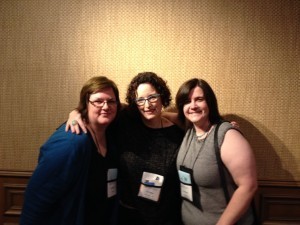 At Left Coast Crime, I got to meet the totally awesome Lisa Alber, with whom I’ve carried on a six-month online friendship at The Debutante Ball. We’re the first 2014 Debs to meet in real life, and we also got to meet Susan Spann, a 2013 Deb! The mysterious Debs (from left, me, Lisa, Susan).
At Left Coast Crime, I got to meet the totally awesome Lisa Alber, with whom I’ve carried on a six-month online friendship at The Debutante Ball. We’re the first 2014 Debs to meet in real life, and we also got to meet Susan Spann, a 2013 Deb! The mysterious Debs (from left, me, Lisa, Susan).
I was in some good company, catching up with some of my favorite people in life, including Catriona McPherson, who made us all cry during her acceptance speech for the heartily deserved Bruce Alexander Award for Dandy Gilver and a Bothersome Number of Corpses (loved it). And I met some new favorite people, like M.P. Cooley, author of Ice Shear (reading it, loving it). We were on a panel together, along with Sherry Harris, Carlene O’Neil, and Holly West, who ROCKED their first panel ever as the “New Deadly Voices.”
Oh, and Louise Penny plopped down next to me at a panel and I held her hostage until she agreed to this photo. 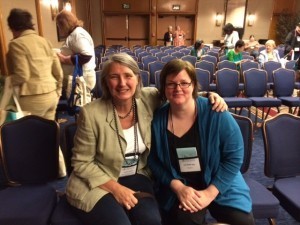 No Louise Pennys were harmed in this making of this photo.
No Louise Pennys were harmed in this making of this photo.
Louise was the international guest of honor, and she was fabulous at every turn. We all want to be Louise when we grow up. When we grow up tomorrow. And not just because she sells a Quebecoise-swearing lot of books. She’s just funny and genuine, and seems like the kind of person you could drink wine with. She also appears to be a dog person, so we shall get along wonderfully when I move into her house with mine.
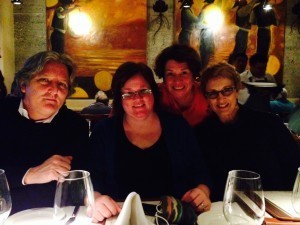 The other great people I met were some of my fellow Seventh Street Book authors: James W. Ziskin (don’t forget that W) and Terry Shames. Along with Lynne Raimondo, who lives nearby and so has become a local writing friend, we had a blast. Rumor has it Robert Rotstein was also in attendance, but he did not appear in mortal form to me, so. You be the judge. We, minus this supposed Bob person, had dinner one night during the conference and had a blast. Lynne’s son and husband may not have had a blast, but they sat through us all being our dark-humored selves. Terry’s novel A Killing at Cotton Hill was up for one of the awards at Left Coast, so we were all excited to be there and to have one of our own, as they say, killing it.
The other great people I met were some of my fellow Seventh Street Book authors: James W. Ziskin (don’t forget that W) and Terry Shames. Along with Lynne Raimondo, who lives nearby and so has become a local writing friend, we had a blast. Rumor has it Robert Rotstein was also in attendance, but he did not appear in mortal form to me, so. You be the judge. We, minus this supposed Bob person, had dinner one night during the conference and had a blast. Lynne’s son and husband may not have had a blast, but they sat through us all being our dark-humored selves. Terry’s novel A Killing at Cotton Hill was up for one of the awards at Left Coast, so we were all excited to be there and to have one of our own, as they say, killing it.
And then this week I went to speak to graduate students and potential graduate students of journalism at my alma mater. Good group, and they took my ribbing them about having all the amenities my class of journalism students never had pretty well. The writing professor I worked with most closely during my first graduate degree at Ball State University, Mark Massé, was there, but not early enough to hear me gushing about how awesome he is. So he’s lucky they filmed the panel, isn’t he?
In short, I have lived three lifetimes in the last two weeks and now I deserve these pajama pants and this drink and this early bedtime. *yawn*
OK, April, what do you have in store?
The post March conferences: In like a lion, out also like a lion appeared first on Lori Rader-Day.
March 26, 2014
CONTEST: Win VINTAGE by Susan Gloss
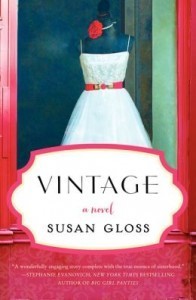 This week is the launch of my friend Susan Gloss‘s debut novel, VINTAGE—and, to celebrate, I’m giving away a brand new copy of it to one lucky reader here on my site!
This week is the launch of my friend Susan Gloss‘s debut novel, VINTAGE—and, to celebrate, I’m giving away a brand new copy of it to one lucky reader here on my site!
Simply post a comment on this blog post before five p.m. (Central) Friday, March 28. I’ll draw a winner ASAP and email the winner for shipping information. I’ll purchase your book from your online store of choice and have it shipped to you (U.S. addresses only, please), or you can select to have your book purchased and waiting for you at your favorite local independent bookstore.
Susan and I are among the 2014 class of The Debutante Ball, and we have had so much fun. Susan’s book is a fun read, with gorgeous clothes and fashion, of course, and great female friendships. Good stories are always in fashion.
Susan’s also having a giveaway you should march over and enter. You could win a vintage LV handbag and an Etsy gift certificate to dress yourself up pretty.
So, happy launch day, Susan. To the rest of you, happy commenting!
The post CONTEST: Win VINTAGE by Susan Gloss appeared first on Lori Rader-Day.
March 25, 2014
Congrats to the KILMOON winner!
 Congrats to Christina Lay, who won a copy of Lisa Alber’s KILMOON!
Congrats to Christina Lay, who won a copy of Lisa Alber’s KILMOON!
Christina has chosen to have her copy put on order at her local independent bookstore (I LOVE THAT OPTION!!), so it will be waiting for her at Tsunami in Eugene, Oregon very shortly.
Now if you missed the boat on this one, never fear. Kilmoon is available wherever fine mysteries are sold and at a very reasonable price. Getcher own. You won’t be sorry.
The post Congrats to the KILMOON winner! appeared first on Lori Rader-Day.
March 24, 2014
THE BLACK HOUR gets a little sister!
I mentioned my big news on Facebook and Twitter but kinda forgot to put it here. Oops. Not like I had a fantastic, gorgeous site built just for this kind of news, right?
Oops again.
But here it is: I sold my second novel, a mystery tentatively titled Little Pretty Things to Seventh Street Books! The book will likely be out in July 2015. It’s the story of a woman working below her potential at a roadside motel—and facing down her ten-year high school reunion—when her estranged best friend from school shows up and gets murdered.
Seventh Street is publishing my first novel, The Black Hour, of course. They’ve been so supportive and responsive to all my dumb newbie questions. I feel very well taken care of there, so it’s really exciting to have another book with them.
Thanks to my agent, Sharon Bowers, for sealing the dealio, and to my editor Dan Mayer for keeping my newest project in the Seventh Street Books family. I met some of the SSB authors at a conference this week, and I am SO HAPPY to know all these people.
I’m a lucky gal. I know it.
The post THE BLACK HOUR gets a little sister! appeared first on Lori Rader-Day.
March 18, 2014
CONTEST: Win KILMOON by Lisa Alber
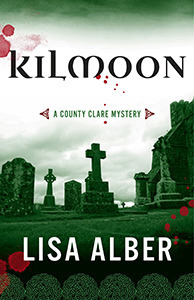 This week is the launch of my friend Lisa Alber‘s debut novel, KILMOON—and, to celebrate, I’m giving away a brand new copy of it to one lucky reader here on my site!
This week is the launch of my friend Lisa Alber‘s debut novel, KILMOON—and, to celebrate, I’m giving away a brand new copy of it to one lucky reader here on my site!
Simply post a comment on this blog post before five p.m. (Central) Wednesday, March 19. I’ll draw a winner ASAP and email the winner for shipping information. I’ll purchase your book from your online store of choice and have it shipped to you (U.S. addresses only, please), or you can select to have your book purchased and waiting for you at your favorite local independent bookstore.
Lisa and I are among the 2014 class of The Debutante Ball, and we have had so much fun. Lisa’s book is the second of our five debut novels to launch. It’s such a great way to be a debut author—together. This week also marks my first chance to meet Lisa or any of the Debs. We’ll both be at Left Coast Crime in Monterey this week! So excited.
I’ve had the pleasure of reading Kilmoon already, and you’re in for a treat. It’s a twisty turny moody mystery with an ensemble cast of people with secrets to hide. The main character is Merrit Chase, whose life hasn’t been easy and who hopes that meeting her biological father is the beginning of a new life. And boy IS IT. It’s also the beginning of a news books series, one I’m happy to be in on at the ground floor.
So, happy launch day, Lisa. To the rest of you, happy commenting!
The post CONTEST: Win KILMOON by Lisa Alber appeared first on Lori Rader-Day.
March 9, 2014
This week at PLA
Anyone going to be library-ing it up at the Public Library Association’s conference this week in Indianapolis?
I hear the city is double-booked with high school basketball tournaments. That is bad news.
But I’m excited to see some writer friends, some librarian friends, and to sit at both the Random House and Sisters in Crime booths SIGNING MY VERY FIRST ARCS. Here’s my schedule. Come say hi.
Thursday
9:30-10:30 Random House signing at RH Booth #1636. I’ll be signing ARCs of The Black Hour for the first time. (Random House distributes for Seventh Street Books, my publisher. You didn’t miss a coup or anything.)
3:30-5:00 Booklist Party at Booklist Booth #1717. Wine, cheese, mystery and intrigue. And my friend Keir Graff, who I can’t manage to see in Chicago.
Friday
11:30-12:30 Sisters in Crime signing at SinC Booth #753. I’ll be signing a fresh supply of The Black Hour ARCs. Come grab one!
Oh, wow. I need to get a handle on my signature. It’s a mess.
The post This week at PLA appeared first on Lori Rader-Day.
March 3, 2014
Leave room in the suitcase for books
Today’s my day on the Debutante Ball, where we’re talking about writing conferences. My post is basically a list of all the places I’m going to be this year.
(I should point out that my husband and VERY LARGE BLACK DOG will be guarding the house while I’m flitting around the country, so don’t get any ideas, marauders.)
The post about going to mystery conferences is timely because last night was Oscar night. Relevant how, you’re asking? Relevant because Oscar night is just like any other industry getting together to have their jollies. For Hollywood types, it’s the awards season. For mystery writer types, it’s the hotel bar at Bouchercon.
And seriously—there’s nothing like hanging out with your tribe comparing notes and telling lies. Maybe we don’t look as glamorous as Lupita or Charlize when we do it, but we get to eat actual food the week prior, so let’s call it even.
As I’m spiraling madly toward the release date of THE BLACK HOUR, things are getting busy. But I’m still looking forward to all my conference plans. Even if I won’t get much writing done. Even if traveling is exhausting. Even if I will never look as good as the worst dressed starlet at the Oscars last night. (I didn’t watch, so I don’t actually have an opinion about this. Honestly, I usually like Ellen’s tuxes and suits better than most of the starlet’s dresses.) And the reason to look forward to conferences isn’t to sell books (you don’t, I hear) or to “make a name” for yourself (who knows how that actually happens). It’s to see your friends and, in our case, talk about where to hide the fictional bodies.
If that sounds like your kind of tribe, I’ll see you out on the mystery conference trail.
The post Leave room in the suitcase for books appeared first on Lori Rader-Day.
February 14, 2014
Still Life
Originally published by TimeOut Chicago
February 14, 1929
A photograph could never tell the entire story. How the chill of the garage’s stone floor seeped through the bottoms of our shoes into our bones. How the room smelled of raw meat and tin, like a storage locker of beef down in Back of the Yards in the middle of winter, only the cold keeping the stench at bay.
The same principle was at work here on Clark Street, of course, except the butchering had been of men.
Camera stand over my shoulder, I followed an officer into the high-ceilinged garage past men in uniforms, men in hats and coats, men with notebooks, cameras, and grave faces. I recognized photographers from the Daily News and the Daily Tribune, among others. We nodded to one another and looked away.
Up against a white brick wall at the back of the garage lay six corpses. One man, still breathing, had been taken to the hospital. As the officer led me through the room toward the bodies, I heard another officer talking about this last man as though he, too, were already dead. Seven, then. Seven dead in a single morning.
My escort, a young officer in a uniform still deep blue, still crisp at the seams, directed me toward a spot several feet away from the bodies, next to a dusty Ford. “There was a dog,” he said. His breath formed quick clouds as he spoke. “A dog howling when the boys got here. Just the dog. The only living thing in the place.” He scratched at the side of his face until a pink welt rose on his cheek.
I backed up to the car and telescoped the stand to the height of my chin. I kept my gloves on.
“I heard the dog belonged to the mechanic,” the officer continued, looking over his shoulder at the dead.
He didn’t have to tell me which was the mechanic. Five were career men, the sort often found in their own cars with blood trailing from holes put in their heads. They wore suits and vests, pocket watches still in place. They had worn wool overcoats. Chicago’s winter sent a chill that seemed to come from within, as though inside the human body was a hollow space that answered when the bitter wind bit the skin. The men had kept their great coats wrapped around them and now sprawled in them, all but the mechanic who wore his over-alls and worn boots. He had been working, only working as I was now. But he lay side by side with the rest of them, his head opened with a bullet and the contents of his skull spilled onto the hard floor. Beside the new void at his temple, a buff tan hat meant for another’s head rested on its side, empty.
Inside the bucket of the empty hat lay a poem. I worked in images—on film for the Post, of course, but for myself in poetry. In spare words committed to paper with a thin thread of ink that reminded me of the artists back home in Hiroshima. As I worked, as I rode the train, as I sat down to my dinner in my basement apartment and told Florence all the foolish and untidy things I had seen that day as I tramped around the city, in my mind I was trimming the full and vibrant colors and smells into a bare branch with a single blossom: a poem. In my desk at home, I kept the results of my life’s art, a book of my slim poems and loose sheets of those I still labored to finish. In another drawer, I stored prints of particular photos of mine from the Post. A life’s work, which is not the same as a life’s art.
The empty hat in the garage was a poem that I did not wish to write. I nodded to the officer to step to the side. He blinked at the camera and shifted to my elbow.
“Does it look any better from in there?” he said.
“The same.”
“Is this the worst you ever saw, Togo?”
Every Japanese man was Togo, so I was Togo. The officers knew me that way, even the ones I did not know. The criminals knew me. Even the ones I did not want to know me. If Al Capone himself walked in to take credit for this day, he would greet me as Togo. I was the only Japanese news photographer in the city, but one would believe the only Japanese man in the country from how easily everyone called to me by name.
Was it the worst I’d seen? I turned to the camera, viewing the scene anew. Four men lay in a row, as though they had been tucked into a large bed. One slept at their feet, face down. The last hunched on his knees at a round-backed wooden chair. Blood ran toward the center of the room. Later that day when I returned to the newsroom, I would release the image from the machine in my hands, like a dragon from a cage. The city would see the blood, black, and no one would remember that someone—call him Togo or call him Fujita, the name will not be printed—had stood in the dust of men’s bones to face the dragon so that they did not have to.
This was not the worst I had seen. In ’15, I had stood on the side of the Eastland, a ship overturned in the Chicago River. My camera found a fireman carrying a dead child up from the water, one of hundreds of corpses that day. Men, women, and children—whole families. This was the worst, and the worst of it all was how innocent I had been, how eager to take pictures, how willing to crawl upon the sideways ship while everyone else crawled off.
My camera jostled as the young officer bumped my arm. Trying to see what I could see through the camera, he breathed his cabbage smell into my neck. Cabbage, even at this early hour.
“Sir,” I said.
He stood back. “The Tribune was here first,” he said.
“The Tribune pays its many photographers enough to buy cars and also gas to fill the tanks.” The men from the Tribune had finished with the crime scene but were nearby, already slipping cigarettes to the uniforms for information. I had taken the elevated to the scene, but I would not rush only to keep up with the Tribune men. Photography was not poetry, but there was still dignity to a job well done. I studied the light falling across the floor, the mechanic’s face and brains. In the corner, the body kneeling at the chair looked as though he had been shot praying.
“And,” I said. “The Tribune has the money to build a castle in which their photo men put up their feet after doing one-fifth the day’s work I do. Kings, every last one of them.”
I let my camera droop in my arms. I couldn’t get it all—the six bodies, the white wall chipped away by a spray of bullets, the blood running in rivulets from the backs of their heads toward my feet. The empty hat. If I had a larger lens, or more room to back up, I might show it as it really was. I pressed flat against the car, but it was no use. “Where did the Tribune photographers stand—never mind.” I would find a better place.
At the front of the garage, a door opened and a woman’s voice reached out and turned my head. At once I thought of Florence, but of course it was not her. The door closed. The voice was clipped to silence.
The officer chewed at a fingernail and watched a knot of his fellows just inside the door.
“What did she say?” I said.
He dropped his hand from his mouth. “Police business.” He turned back to me, squared his shoulders. Such a young one. Such a young one that I remembered, shaking my head, what it had meant to be so young. To be released upon the world. I had left Japan at sixteen to be free of everything Hiroshima held for me—failed romance and humiliation being the largest part, but I will not speak of it—and found myself, after a bit of wandering, here, with a camera in my hands. Nearly thirty years had gone. I hardly remembered the streets I once walked every day.
I let the camera rest heavily on my shoulder and flapped at the pockets of my coat for a cigarette. The match offered a brief glow, a brief warmth. The flash of a match head burning—here, also, a poem lived in each flare and in each tiny death that followed.
“What is your name, Officer?”
He glanced uneasily at the bodies. “I can’t tell you anything.”
I wondered what he thought he knew. Did he know, for instance, what had happened to the dog that had been found? I didn’t know, but I could suppose. One more bullet in a day filled with bullets. One more body in a day stacked high with bodies. I waved the cigarette in the air between us. “Not for the paper. What do the men call you?”
“McCormick. They call me something else.”
“Ah.” This I understood. “Are you related to the newspaper man, then?”
“I wouldn’t be standing here freezing my arse off with you if I was one of them rich ones, would I?” His own name seemed to remind him that he stood in a cold situation in a cold town.
I smoked, nodding as though the brat had said something worth considering.
I said, “I believe that woman at the door said that the men she saw leaving this place with guns wore police uniforms.”
The boy paled and looked away. I followed his eyes toward the other officers, who shuffled their feet and discussed matters in low voices. Occasionally, one of them broke away to peer at the bodies. I wondered what they saw that I could not. McCormick said nothing. His mouth tightened into a straight line.
“An interesting turn of events, isn’t it, Officer McCormick?” I gestured toward the group of police. “Which one do you suspect?”
He frowned. “You can’t report what she said.”
“I am not a reporter. May I look about for a better place to shoot?”
McCormick blinked at my camera again. “Shoot?”
“Shoot the film. I will look. You have much to do.” I gave a bit of a bow, the sort of thing Americans seemed to expect, hitched the equipment onto my back, and edged past the boy and the trunk of the car. When I glanced back, Officer McCormick stood in the same place, nothing to do, chewing on his fingers.
“Stay away from the—” He gestured toward the blood on the floor.
“Of course.”
I had already decided that where I needed to be was on top of the car. I would probably find footprints from the Tribune men who had been there before me, but blast it—Post readers needed to see this spectacle, too. Arriving to their dinner tables this evening, our gentlemen would unfold their Post to find the city under fire and their stomachs turned. Our ladies would have already seen, or perhaps they would have tried not to see. They would have shielded the children’s eyes, fed them dinner early, and sent them up to bed so that when Father came home, the matter could be openly discussed.
This was in other households. In mine, Florence would have read the paper front to back before I arrived. She would have a drink ready for me, and there being no children and, in fact, no marriage, we would discuss the massacre up and down. How the city was overrun by hoodlums and opportunistic beasts, and how one never knew who might be a cousin or godson to one of them. “Keep clear of it, Jun,” Florence would advise. “Of course,” I would reply, but not everyone could steer clear of it. How could I stay out of the picture, when as soon as someone was shot in the street, I came along on the elevated to lean a camera down into the man’s missing face?
My job made it difficult for me to lead the quiet life I desired. In ’19, I had gone out to cover the riots on the south side. A black man, swimming at the black beach, had ventured across an invisible line in the water into the white area, and another man—need I say that he was white?—threw a rock and caused the black man to drown. In the neighborhoods nearby, men of both colors started fires, beat and shot one another. I took my camera to the streets, the most conspicuous of witnesses. In the drawer of my work at home, there was now a print of a black man, unnamed, lying dead in an alley. I took this photo. Also in the drawer was a print of some uniformed militia stopping men on the street for the simple blackness of their skin. I took this photo.
Sometimes in the evenings, I accepted the drink from Florence and, instead of going to the dinner table, went to the desk. Reading my poems again, I would be greeted as if by old friends, friends as dear to me as Florence’s lovely lily face. But when I re-viewed the photographs, I was ill at ease. I had not shot myself standing in these scenes, but I was there, nonetheless. I am there in the alley with the man killed for the color given him by nature. I, whose color was also not white. I am there on the street with the men harangued for walking to work or to the store. I, who had also been questioned for being on that street on that day. I, who drew stares when walking down any street on any day with dear Florence’s pale arm through my brown one.
I was an imperfect witness to the events of my city. Every image I created failed. Every image I created reflected back to me what I was and what I was not. Perhaps others could read the impersonal news from my photos. I only saw that I was there, off to the side, out of the frame. I saw it, but no one else did. No one would remember.
In the garage, I slid my camera onto the flat roof of the Ford. I used the hub over the wheel to propel myself up onto the car. At once I knew that I had found the right location. I brought myself and the camera upright and quickly set about framing the situation before anyone could tell me to get down.
“Togo,” the young officer said, his voice quiet. He tapped the toe of my shoe. “I don’t think you ought to be up there.”
“Do you have a girl, Officer McCormick?”
He turned his face up to me, eyebrows furrowed.
I turned to the camera, at last satisfied by how the room opened up, how the six men’s bodies could be singled out, how the poor mechanic’s face—he had been a good-looking man and certainly someone had loved him—looked up from the floor.
“What does that have to do with the price of tea in—”
“Find yourself a girl, Officer McCormick. No, not a girl. A woman, a woman of passions and intellect with whom you can pass the days of your life. Also find yourself an art. So that your hours are not empty. So that your life is full, no matter how it ends or when.”
The boy glanced at the bodies, then away. He left me to my work. In a few minutes I had captured the scene and was done. Next, I would drag my camera to all the dank corners of the garage and burn more images, and then, once the police forced me and my fellows out the door, I would climb another car outside, or perhaps find a tenant at home in the building across the street and lean my camera out her window. And then back to the train and down to the Post in time for the evening’s deadline. This harsh day would be done soon enough, and I might find myself at home, at my desk. Perhaps there were a few words yet to be written in the thin black ink. Perhaps I could crawl into the dead man’s empty hat and have something, however small, to say.
Across the garage I saw a bustle. One of the men from the Tribune was climbing atop another car. A second man passed a camera up to him. From the front of the garage, two more with equipment raced to join him, and soon the top of the other car held all three men with their cameras turned on the bodies from above. I leaned into my own camera and took one last image of the room, the photo men hanging over the bloody floor like martyrs in stained glass looking down from a cathedral window. The Tribune man raised his flashbulb into the air. In the pop of the bright light lived a poem. A handful of words about quick life and quick death. If only I could write it, if only I could say with certainty which emotions rose within the hollow space in my body when I realized that in their images—in all of their images—it was I who would be standing over the dead men. It was I who would be the only living thing in the place.
-Lori Rader-Day, Chicago, 2008
The post Still Life appeared first on Lori Rader-Day.
February 13, 2014
Sometimes timely by accident
On Monday, I posted at The Debutante Ball about my first love. Yes, yes, my mother, my dad, my little sister, books, cupcakes, etc.
I wanted to talk about my Pooh bear.
Turns out today is (debatably) Winnie-the-Pooh’s 90th birthday. Wow. Sometimes I just back into these things by accident, but I’ll take it.
Additional story about my Pooh bear: My bear was such a part of my family life for so long, that when I had to be put in the hospital at the age of 22, my dad brought her in to my bedside. My uncle’s wife, rather new to the family, took a look and said, “Well, that’s one ugly Winnie-the-Pooh.”
There were quite a few people in my room keeping me company and everyone was all, “Oh, no, she didn’t.”
My grandma loved to retell this story because, she said, I gave my aunt such a death-ray look. My grandma knew I’d go over my hospital tray in defense of my bear.
True love, yo. Happy Valentine’s Day!
The post Sometimes timely by accident appeared first on Lori Rader-Day.



